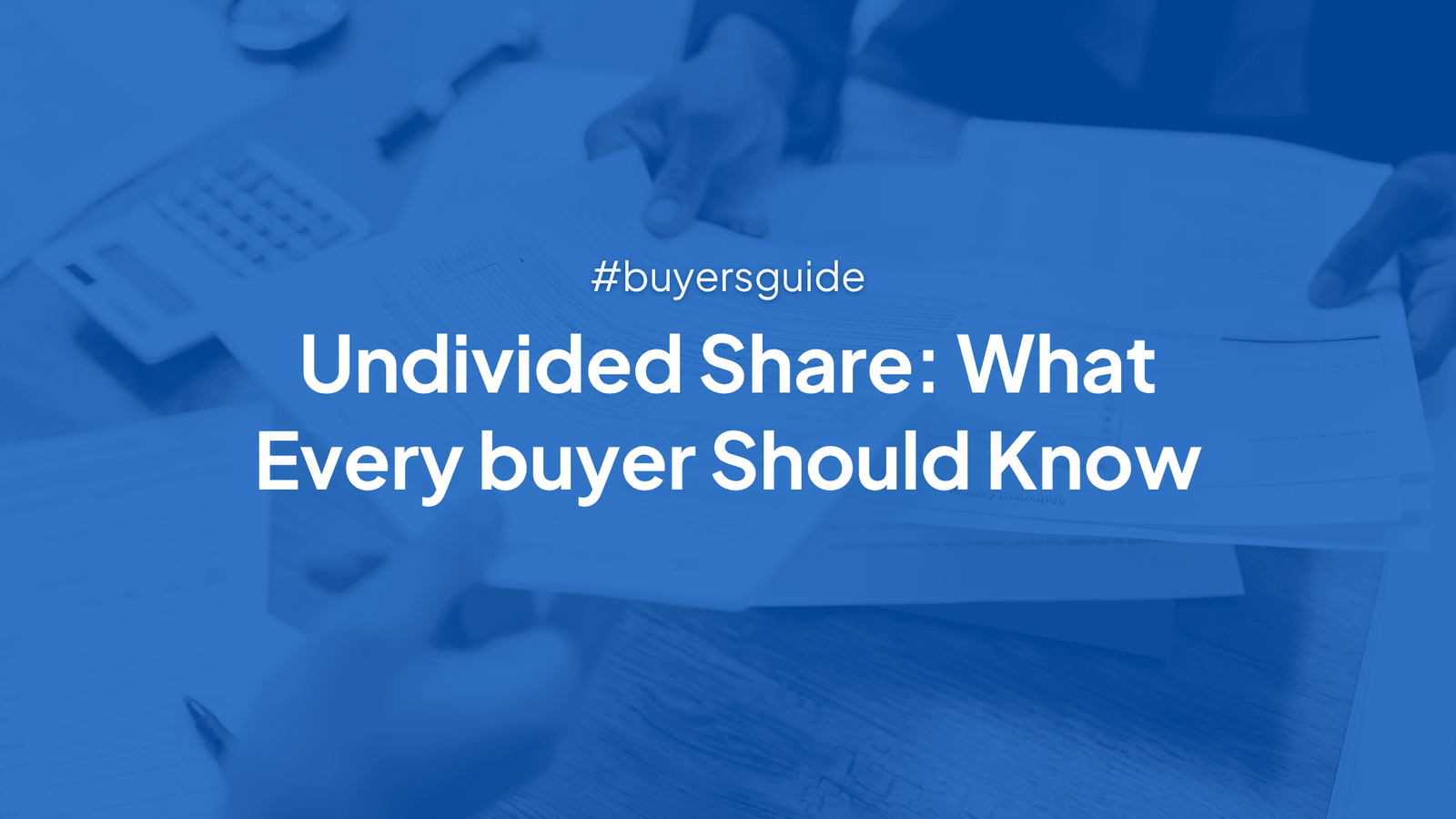When buying an apartment or flat in India, most buyers look at the built-up area, location, amenities, and pricing. But one crucial legal aspect that often gets overlooked is the undivided share in property also known as UDS.
Understanding your undivided share in property is essential to protect your ownership rights and long-term investment. In this blog, we’ll explain what UDS is, how it’s calculated, why it matters, and the legal implications for buyers.
What is Undivided Share in Property (UDS)?
The undivided share in property refers to the portion of land that belongs to you in a group housing or apartment project. Since flats are built on a common piece of land, each flat owner owns a proportional share of that land.
This land portion:
- Has no specific boundaries.
- Is legally yours, even though it’s not demarcated.
- Gives you co-ownership of the total land on which the building stands.
So, while you own the constructed flat (super built-up area), the UDS ensures that you also legally own a piece of the land it stands on.
Why is UDS Important in Real Estate Transactions?
The undivided share in property plays a major role in determining the real value of your investment, especially in the long term.
Here’s why it matters:
1. Land Appreciation
Buildings age and depreciate over time. But land appreciates, and since UDS represents your share in the land, your UDS value increases over time.
2. Legal Ownership Rights
In case the building is redeveloped or demolished, your claim is based on your UDS, not your flat’s size. Without UDS, you’re not a legal co-owner of the land.
3. Mortgage and Loan Approvals
Banks assess the undivided share in property during loan approvals. If UDS is not mentioned or is disproportionately low, it can affect financing.
4. Reconstruction or Redevelopment
In the future, if the building is reconstructed, developers negotiate based on UDS. A higher UDS means a better bargaining position.
How is Undivided Share in Property Calculated?
There’s no fixed UDS for all units and it depends on the flat size relative to the total built-up area.
UDS = (Individual Flat’s Built-up Area / Total Built-up Area of All Flats) × Total Land Area
For Example:
- Total land area = 10,000 sq. ft.
- Total built-up area = 20,000 sq. ft.
- Your flat size = 1,000 sq. ft.
Then your UDS = (1,000 / 20,000) × 10,000 = 500 sq. ft.
Note: UDS is mentioned in the sale deed and should always be cross-checked with a legal expert.
| Feature | Undivided Share (UDS) | Super Built-Up Area |
|---|---|---|
| Refers to | Share of land | Flat + common areas |
| Measured in | Square feet | Square feet |
| Impacts | Legal ownership | Pricing & maintenance |
| Depreciates? | No | Yes (construction depreciates) |
| Mentioned in Sale Deed? | Yes | Yes |
Many buyers confuse super built-up area with UDS, but only UDS grants land ownership, not your flat size.
Legal Tips for Buyers on UDS
Before finalizing any apartment purchase, ensure you:
✅ Ask for the exact UDS in square feet.
✅ Verify that it’s included in the sale deed.
✅ Compare UDS across flats in the same project. Larger flats should have proportionally larger UDS.
✅ Check with a property lawyer if the builder has transferred the UDS to the flat owners.
✅ Avoid projects where the builder retains a large chunk of UDS without clarity.
Check 8 Must-Read Books for First Time Home buyers
Common Issues Related to Undivided Share in Property
1. Disproportionate Allocation
Some developers unfairly allocate UDS, giving more to some owners and less to others, which becomes a problem during redevelopment or resale.
2. Builder Retains Ownership
In some cases, the builder retains part of the land, which can affect future construction rights.
3. Not Transferred Post Construction
Legally, the builder should transfer UDS to the buyers upon registration. Delays or refusal can lead to disputes.
UDS in Joint Developments and Redevelopment Projects
If your apartment complex is considered for redevelopment, your undivided share in property becomes the most valuable asset. Developers often offer:
- Compensation based on UDS
- Additional built-up area or rent during construction
- Ownership in the new construction
Hence, knowing and securing your UDS is a future-proof strategy.
Conclusion
Understanding your undivided share in property is more than just a legal checkbox. It’s your stake in the most valuable part of your apartment: the land.
Before you buy, always:
- Verify UDS calculation
- Include it in legal documents
- Understand its role in future redevelopment or resale
A well-informed buyer makes better investment decisions and UDS should be at the core of that.



